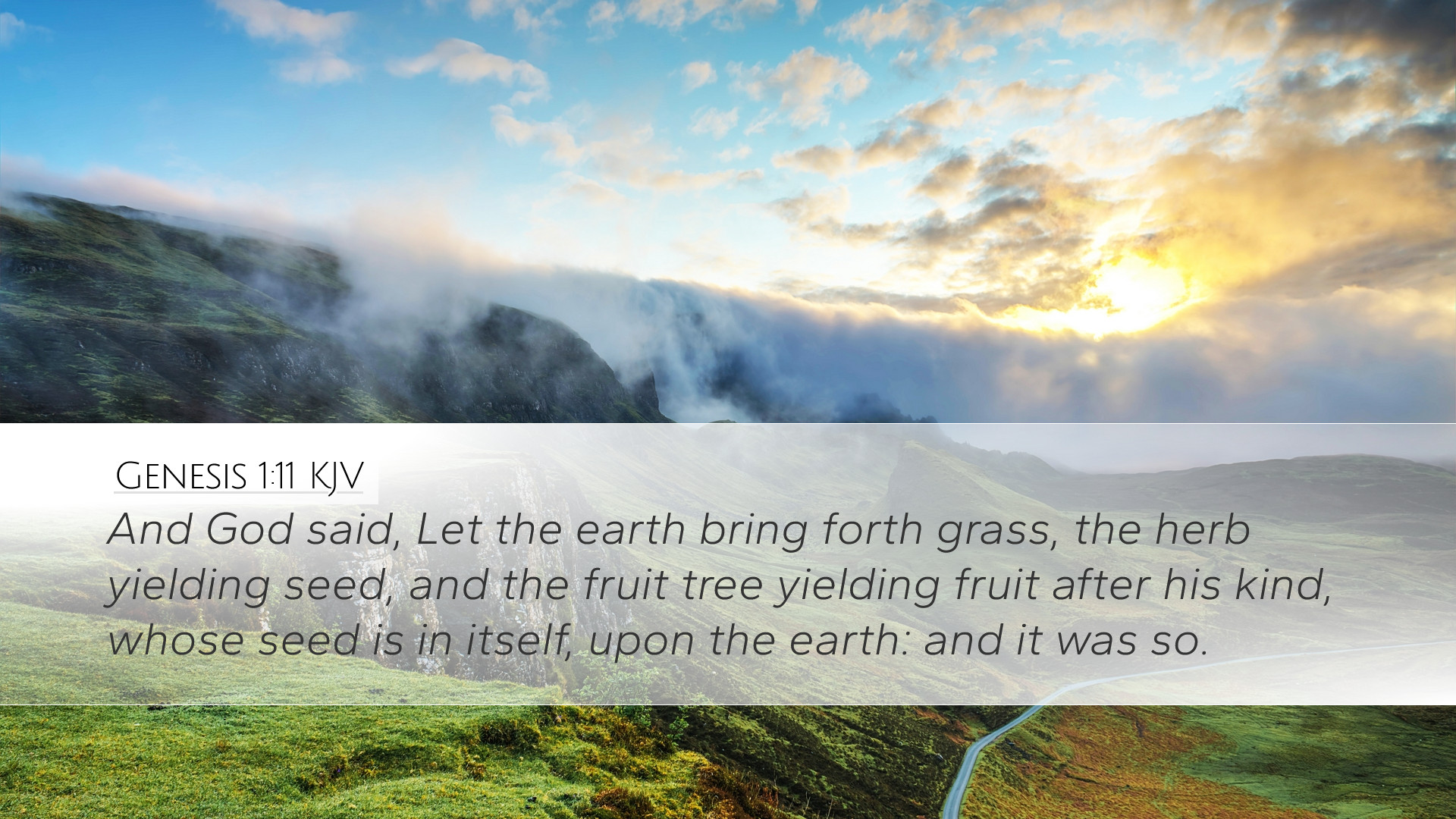Commentary on Genesis 1:11
Verse: "And God said, Let the earth bring forth grass, the herb yielding seed, and the fruit tree yielding fruit after his kind, whose seed is in itself, upon the earth: and it was so." (Genesis 1:11 KJV)
Introduction
This verse marks a significant moment in the creation narrative found in Genesis. It illustrates God's command for the earth to produce vegetation, emphasizing His authority as the Creator and the inherent orderness of creation.
The Divine Command
The phrase “And God said” reaffirms the potency of God’s word in creation. According to Matthew Henry, this shows that God was not merely a bystander but actively engaged in the creation process, commanding existence with a simple utterance. God’s spoken word implies a direct exertion of His will, shaping the natural world.
Creative Power
Albert Barnes highlights that this command illustrates God's power—He does not need to intervene physically in the creative process. Instead, His word alone is sufficient to bring forth life. This emphasizes that creation is not the result of random events but orchestrated by divine command, demonstrating God’s sovereignty.
The Role of the Earth
When God instructs the earth to bring forth greenery, it indicates that the earth has a role in creation. Adam Clarke suggests that this partnership between God and creation establishes a cooperative relationship, where the earth is entrusted with producing life. This reflects the nature of creation, which operates under divine authority but also through its designed processes.
Types of Vegetation
The verse distinguishes between different types of plants: grass, herbs, and fruit trees. Each category serves a unique purpose within God’s creation:
- Grass: Represents the basic sustenance of the ecosystem, catering to animal life and stabilizing the soil.
- Herbs: Imply a diversity of plants, often used for medicinal and nutritional value, enhancing human sustenance.
- Fruit Trees: Indicate the provision of nourishment and pleasure, emphasizing God's generosity toward creation.
Seed Within Itself
The phrase “whose seed is in itself” is of profound significance. Matthew Henry notes that it underscores the principle of reproduction inherent within God's creations. Each plant is designed with the capability to reproduce, ensuring continuity of life. This design reflects a divine foresight, preordaining the sustainability of life on earth.
Symbolism of Seed
Albert Barnes elaborates on the symbolism of seed as a representation of potential and growth. The notion that the seed is contained within the fruit signifies that life is inherent and self-sustaining, a concept fundamental to both spiritual and physical life. This eternal principle illustrates God’s intention for the flourishing of creation.
Implications for Theology
Genesis 1:11 has profound theological implications. It sets a foundation regarding divine sovereignty over creation. Adam Clarke emphasizes that understanding God as the ultimate source of life is critical for both worship and practical living. When believers recognize that all life is initiated by and sustained through God, it cultivates a spirit of gratitude and responsibility toward creation.
Creation and Stewardship
This verse invites reflection on humanity’s role as stewards of God's creation. It is not merely an account of what God did but a call to care for the earth, as it is entrusted to human beings. The principles of stewardship come from the recognition that the world operates according to God’s design and commands, and His creation is valued.
Faith and Trust in God’s Provision
Furthermore, the act of creation demonstrates God’s provision for His creation. Pastors and theologians can convey that, just as God provides for the plants, He also cares for His people. This assurance invites believers to trust in God’s plans for sustenance and sustains life during uncertain times.
Conclusion
In summary, Genesis 1:11 is rich in meaning, drawing attention to the power of God’s word, the cooperative role of creation, and the intentional order established in the natural world. For the pastor, student, or theologian, this verse serves as a reminder of God’s sovereignty and an invitation to live in accordance with His design.
As we ponder the implications of this verse, let us consider how we can honor God through our relationship with creation, recognizing our essential role in God's ongoing creative work.


